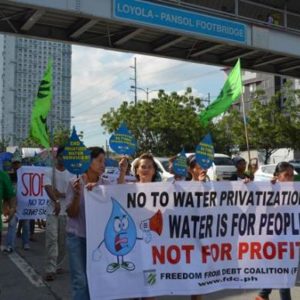Photo credit: Rovik Obanil, Freedom from Debt Coalition, during the international week of action in Manila, Philippines. Protest led by the Freedom from Debt Coalition.
The World Bank has been leading the charge to privatize water for decades, despite mounting evidence that corporate control of water is a threat to health, human rights, and democracy itself. The reason: The World Bank is not only a development institution, but it is also a shareholder and major investor in the water corporations whose interests it promotes. And it uses its clout to push public officials to enter private water contracts.
As one of the world’s largest funders of water projects, the World Bank has enormous influence through its loans alone. But it also directly trains and advises government officials, and produces a steady stream of slick research and marketing aimed at prioritizing profitability over public access to water.
World Bank markets Manila Water’s “successes”
A key tool for the Bank in marketing private water to public officials is its poster-child “success story” in Manila, Philippines, where the IFC designed a profitable contract and then purchased part of the contractor, Manila Water Company (MWC). By the IFC’s own definition, a conflict of interest occurs when “a decision or action taken by IFC in one capacity may be influenced by, or otherwise incompatible with, interests IFC may have in another capacity.” Pushing the government to privatize, designing a profitable contract, and taking an ownership stake in the corporate contractor which stands to benefit is a clear case, yet IFC officials deny any conflict of interest in the Manila case.
Manila activist Jen Malonzo traveled to Washington last year to tell World Bank executives that the privatization there has been anything but a success, with people forced to choose between using safe water, paying their rent, or feeding their families. But her pleas have fallen on deaf ears. After MWC took the government to arbitration to demand additional rate hikes, Jen tried again, this time at the World Bank’s Manila office. She hoped to deliver a letter from local residents and activists demanding MWC withdraw its challenge and calling on the Bank to stop marketing Manila as a “success” around the world. But she was not allowed past the receptionist, and received no official response.
Unfortunately, the World Bank’s privatization of Manila’s water is not just a life-threatening tragedy for Manila’s residents. Because as long as the World Bank is allowed to continue its Ponzi-style marketing of one failing project to generate other projects, the suffering of Manila’s residents will be replicated in city after city around the world. For instance, in a June, 2012 workshop in Senegal, the World Bank presented the Manila “success story” to dozens of African government officials, and within months had secured agreements to carry out a similar role to privatize water in Benin and Mozambique.
Lagos resists privatization and World Bank misinformation
The media also reported that IFC had secured a contract to privatize the water in Lagos, Nigeria. But after we worked with Environmental Rights Action (ERA) to shine a media spotlight on the reported deal, and our members delivered 60,000 emails, letters, and phone calls to World Bank officials, the Bank declared that the proposal had been scrapped and would not proceed.
This is only the beginning of the high-stakes campaign to keep Lagos’ water public. Thousands of individuals and organizations from dozens of countries have signed the letter standing with ERA in its message to Lagos officials to say no to the World Bank and no to water privatization. As ERA’s Philip Jakpor declared: “We will resist any attempt to make Lagos the next Manila in the hands of the World Bank and its corporate cronies.”
A key tool for activists and public officials
It is time to stop the World Bank’s self-dealing and misleading marketing in its tracks. Last week, activists in Manila, Lagos, and other cities targeted for privatization stood together to say no to the World Bank and no to corporate control of water. And, since the World Bank has continued to promote the Manila model in blatant disregard of the testimony of Manila’s residents, we have collaborated to publish “Behind the World Bank’s Spin: Private Water’s Failures in Manila and Nagpur” which exposes the truth of the Manila story and of the World Bank’s agenda in promoting it.
Activists in Lagos and around the world are invited to use this tool to counter the World Bank’s misleading marketing and inform utility officials and decision-makers of the truth behind this dangerous spin.



